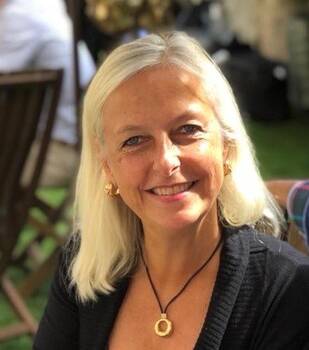Laurence Moret
Expert in Social Innovation and Finance

Finance can be a useful tool for human development
After completing a Master in Finance at Paris IX Dauphine and an MBA at Nicholls State University (Louisiana, USA), Laurence Moret became a financial journalist at the press agency ACP-Telpresse. In 1993, she began a career in the banking sector by joining the marketing department of Banque Cortal (a BNP Paribas subsidiary), where she recruited new clients through saving products and stock exchange investments. She joined Crédit Coopératif in 2001 (BPCE Group), when the bank created an Alternative and Solidarity-based Finance Department. She served as cross-partnership manager in solidarity-based finance and held a seat on the supervisory board of La Nef (an ethical financial institution, Lyon) and Sidi (an investment company dedicated to emerging countries MFI, in Paris). She was Vice-President of Finansol for 16 years.
Laurence is now the External Communication, Institutional Partnerships and Documentary Director of the bank. She also represents Crédit Coopératif at the Board of Directors of the solidarity-based fund “Choix Solidaire”, managed by Ecofi Investissements (a Crédit Coopératif subsidiary), and has an active role in the Ethical Committee of this asset management company.
She has been teaching courses in the HEC Inclusive and Social Business Certificate since 2010. Her classes help students both reflect on the new paradigms of finance and discover the challenges and opportunities of microfinance.
During this very special Covid-19 crisis period, we interviewed her to find out more about her activities and her vision of the future for a more inclusive economy.
At a time when the most vulnerable people are suffering more, what do you think should become a priority for governments or companies (in France or around the world)?
Everyone should step out of their comfort zone, be proactive and set objectives to improve the country's social and environmental situation in their field of activity. These objectives must obviously be followed by actions designed to increase positive societal impacts and reduce negative effects. Of course, these commitments must be reviewed, allowing for the initiation of virtuous dynamics of continuous progress.
How do your own activities contribute to the creation of a more inclusive economy?
Through teaching, I contribute to the students' awareness that finance can be a useful tool for human development. Conceived with societal engagement in mind, it has the potential to contribute to long-term well-being for everyone, and not just short-term benefits for the few. It is important that students keep this in mind in their professional lives.
Through my job at Crédit Coopératif, I also work to pass on these reflections. At the same time, I promote banking products and services that implement this engagement to contribute positively to the development of the real economy, an economy that’s useful to all and respectful of the environment. Through traced products (which create a link between the investor’s wishes and the projects developed by entrepreneurs) or sharing products (which make it possible to support the general interest structure of one's choice over the long term), the Crédit Coopératif offer shows that another kind of bank is possible. A bank that refuses to finance the sectors that do damage (such as fossil fuels) and supports initiatives inspired by the common good.
In your career, what is the impact that you have tried to achieve thus far, the constraints that you have faced and the results that you can be proud of ?
I am very happy to be able to help people discover that finance and banking are "consumable" services, on a par with food, transportation and energy. Giving meaning to one's money is possible, and it contributes to the coherence of everyone's behavior. It is therefore necessary to demand accountability, commitment and traceability from one's bank, just like we would with any other company.
I have the good fortune to work on highlighting Crédit Coopératif's values, and to be a committed employee within a committed cooperative bank.
What advice would you give to HEC students, young entrepreneurs or intrapreneurs who would like to have an impact and participate in the refoundation of business?
Have confidence in yourself, be innovative in building the world you want to live in tomorrow, propose solutions without imposing limits! It doesn't matter what others think, as long as you are aware that you are contributing to a better world and progress which is both sustainable and shared.